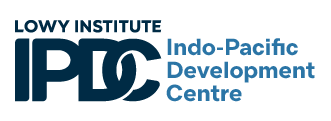Since 2020, Indonesia has tried to transform itself from an exporter of nickel into a key player in the global nickel value chain by banning exports of the raw material in an effort to incentivise nickel customers to invest in “downstream” Indonesian industries such as refining and battery manufacturing. One of the most notable partnerships to result from this policy has come from China, a leading consumer and investor in Indonesian nickel.
The nickel industry had minimal impact on poverty and unemployment.
Our recent visit to Southeast Sulawesi provided a compelling snapshot of where Indonesia’s industrial policy is steering its burgeoning nickel industry, and the challenges this brings. As Indonesia doubles down on this industry, international partners will be crucial for achieving a sustainable and equitable future.
Thanks to China
China has been instrumental in building Indonesia’s downstream nickel industries. Chinese companies navigated Indonesia’s complex regulatory environment deftly and rapidly established several nickel processing industrial parks in response to Indonesia’s export bans. Indonesia’s exports of stainless steel (which uses nickel) and nickel intermediate products has surged as a result, mainly destined for China. But this fast-paced development comes with challenges.
The Virtue Dragon Nickel Industry (VDNI) nickel smelter in Konawe is emblematic of Indonesia’s broader nickel industry. Conceptualised in 2014 at the outset of the export ban on nickel ore and commencing operations by 2019, the swift construction of this nickel processing facility has led to explosive economic growth. But there are growing concerns about environmental, health, safety, and community impacts.
Our visit to the smelter was restricted, forcing us to observe from outside the gate. Local government officials face similar obstacles in obtaining permits to inspect and monitor the site. Such barriers underscore a troubling trend of secrecy and impunity across Indonesia’s nickel sector, raising serious concerns about accountability and transparency.
The smelter’s location in a residential area has exposed residents to harmful industrial emissions. The rapidly expanding settlement nearby suffers from poor planning and inadequate public input. Locals say it resembles a slum rather than a new industrial town.
Unsafe working conditions are causing widespread health problems among local and Chinese workers at VDNI. A private clinic inside the industrial park treats workers, hiding the true extent of the problem. It was reported to us that up to 1 in 5 workers have already suffered from severe respiratory sickness. Again, the lack of transparency is problematic, with lax standards leading to rising accident rates and safety violations that go under-reported.
Local aspirations
The nickel industry’s expansion has had mixed effects on Southeast Sulawesi. Pollution from nickel mining and smelting activities has harmed agriculture and fisheries. Yet much of the food supply for the nickel industrial parks is apparently imported from Java, so local producers not only suffer from reduced output but are excluded from the benefits of a burgeoning industry.
China has been instrumental in building Indonesia’s downstream nickel industries.
The nickel industries prioritise hiring local workers, creating thousands of job opportunities. However, a local skills shortage means workers from outside Sulawesi are being employed in large numbers. The companies also offer conditional employment to landowners after they sell their land, but this leaves workers vulnerable to losing both their land and, later, their jobs.
In Southeast Sulawesi, agriculture, forestry, and fisheries remain the dominant employment sectors. Although employment in the processing industry, including nickel smelting, increased from 5.1 per cent in 2015 to 9.7 per cent in 2023, its ability to generate jobs growth is modest.
Our discussion with former and serving government officials revealed that the nickel industry had minimal impact on poverty and unemployment. Figure 1 highlights the Konawe district’s dramatic rise in economic growth – from 6.1 per cent in 2015 to 15.4 per cent in 2022, and reaching 22.5 per cent in 2023. This is largely due to nickel smelting. Yet not everyone has benefitted: poverty rose from 12.6 per cent in 2022 to 13 per cent in 2023*, and unemployment remains above pre-export ban levels.
Economic gains have clearly not been distributed equitably so far, but many have realised the industry’s transformative potential. The Indonesian Chamber of Commerce and Industry (KADIN) in Southeast Sulawesi aims to turn the nickel sector's challenges into growth opportunities by forging partnerships with government bodies, international investors, local businesses, and community leaders.
Local universities are boosting efforts to train mining and engineering graduates, although are struggling to meet rising demand. Limited expertise and foreign language barriers complicate the issue, prompting partnerships with foreign institutions and companies to enhance skills and resources.
The way forward
China’s partnerships with other countries, such as the joint venture between the Brazilian company Vale (Brazil) and Zhejiang Huayou Cobalt in Pomalaa, illustrate that the outcomes of such projects can be markedly different. This partnership is setting new benchmarks for health, safety, and environmental standards, far surpassing those of Chinese-only smelters. Additionally, they are pioneering the integration of renewable energy into their operations, a key international concern.
Southeast Sulawesi hopes that the nickel industry will catalyse broader economic growth, boost local welfare, and create new opportunities by stimulating other sectors. It remains uncertain if nickel will meet these expectations, but attention must turn to minimising negative impacts to generate the type of growth locals want and diversifying the economic partners to lift the industry’s standards.
* The poverty figures in this article have been corrected from 13.4% to 12.6% in 2022, and 14.1% to 13% in 2023, resolving an error in the original calculation.


